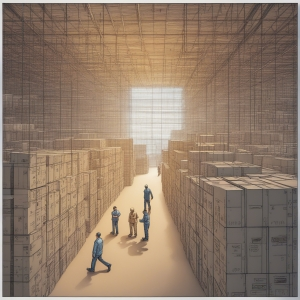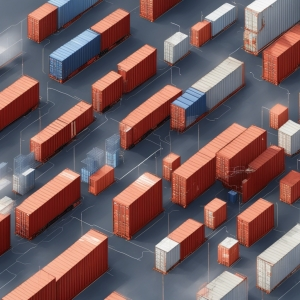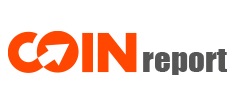Table of Contents:
The world of digital currencies and cryptographic software is filled to the brim with innovative solutions, waiting to transform various sectors. One such ground-breaking innovation is the Blockchain. Famously known as the underlying technology behind cryptocurrencies like Bitcoin, this decentralized ledger has potential applications far beyond just digital currency. This article aims to shed light on the role of Blockchain in streamlining Supply Chain Management (SCM), making processes more transparent, efficient, and trustworthy.
Introduction to Blockchain and Supply Chain Management
Blockchain, at its core, is a decentralized database, shared across multiple nodes (computers) which constantly verify and reconcile transactions. This technology provides an immutable, traceable, and transparent record of all the transactions, leading to a high level of security and trust.
The Best Mining Providers at a Glance
» Infinity HashFrom our perspective, currently the best mining provider on the market. With the community concept, you participate in a mining pool completely managed by professionals. A portion of the earnings are used for expansion and maintenance. We've never seen this solved as cleanly anywhere else.
» Hashing24A well-known and established cloud hosting company. With a good entry point and in a good market phase, a good ROI can also be generated with some patience. Unfortunately, we see the durations as a major drawback.
On the other hand, Supply Chain Management (SCM) is a broad term for all the activities involved in the production and delivery of goods – from raw materials to the final product in the hands of consumers. SCM contains a complex network of suppliers, manufacturers, and consumers with multiple transactions happening at different stages, making it a perfect candidate for Blockchain to bring transparency, efficiency, and traceability.
In the following sections, we will dive into a deeper discussion on how Blockchain is playing a significant role in revolutionizing the supply chain industry.
Understanding the Conception of Blockchain
Let's delve deeper into the conception of Blockchain. It works on the principle of distributed ledger technology, where data is stored across a network of computers, also known as nodes. Every time a new transaction or 'block' is added to this chain, all nodes on the network verify it. Once verified, the block is added to the linear, chronological ledger, which is visible to all participants. Thus, it eliminates the need for a central authority or intermediary and provides a decentralized, transparent, and immutable record of all transactions.
The unique aspect of this technology is its security. Since the Blockchain is shared and synchronized among multiple users, it is highly resistant to tampering, fraud, and cyber risk. In addition, the transparent nature of the blockchain ensures that the stakeholders at all stages of the supply chain have access to the same information, thereby fostering trust and transparency.
Pros and Cons of Blockchain in Supply Chain Management
| Pros | Cons |
|---|---|
| Enhanced Transparency: Blockchain technology allows for better traceability and visibility in the supply chain, offering assurance of origin and authenticity. | Complex Implementation: Blockchain technology can be complex to implement across all links in the supply chain, requiring significant expertise and resources. |
| Improved Efficiency: Blockchain can automate and streamline supply chain processes, reducing time delays, costs, and human error. | Regulatory Challenges: Lack of standardized blockchain regulations and policies worldwide can impede its adoption in the supply chain sector. |
| Greater Security: With its immutable nature, Blockchain offers a secure and unalterable system, reducing the risk of fraud and counterfeit products. | Interoperability Issues: Blockchain systems from different providers may lack interoperability, leading to problems in data exchange and communications. |
Unveiling Blockchain's Role in Supply Chain

The application of Blockchain in Supply Chain Management (SCM) is transforming the way businesses handle and track transactions. The various stages in a supply chain involve numerous parties with separate records. While it works, it may often cause delays, disputes and increased costs due to inefficient record-keeping and lack of transparency.
With Blockchain, each transaction - ranging from procurement of materials, manufacturing, to the delivery of goods - can be recorded and stored in a decentralized, secure ledger that is accessible to all parties involved. This prevents discrepancies in the records and simplifies the lengthy process of reconciliation.
One critical aspect is traceability. In a Blockchain-enabled supply chain, businesses can trace a product right from its source, through every stage of its journey, until it reaches the end user. This level of traceability can do wonders especially in industries such as food, where it’s crucial to track the origin and safety of the products.
Blockchain also promises improved security. Once a transaction is recorded on the Blockchain, it can’t be altered or deleted. This tamper-proof nature of Blockchain prevents fraudulent activities and boosts trust among stakeholders.
Additionally, by cutting out intermediaries and automating processes through smart contracts (self-executing contracts with the terms directly written into code), Blockchain can save time and reduce costs in the supply chain operations.
Advantages of Integrating Blockchain into Supply Chain
Integrating Blockchain technology into Supply Chain Management can open a plethora of benefits. Apart from increased transparency, efficiency, and security, it can also lead to several other game-changing advantages. Let's delve into some of these benefits:
Real-time tracking: Blockchain technology can enable real-time tracking of goods, providing stakeholders with up-to-the-minute information about the whereabouts of a product. This can enhance decision-making and reduce the chances of goods being lost or misplaced.
Reduced administrative costs: By eliminating the need for intermediaries and paperwork, Blockchain can significantly minimize administrative costs. Blockchain's smart contracts can automatically execute transactions when predefined conditions are met, reducing the need for manual intervention and paperwork.
Greater accountability: The immutability characteristic of Blockchain makes every participant accountable for their actions. Any change or transaction made in the supply chain would be visible to all participants, promoting accountability and honesty among stakeholders.
Better inventory management: With the detailed and reliable data that Blockchain provides, businesses can enhance their inventory management, reducing overstocks and outages. This would help in maximizing profitability while ensuring smooth operations.
Improved customer trust: Last but not least, the transparent and tamper-proof nature of Blockchain can significantly bolster customer trust. By providing detailed information about the origin and journey of a product, customers can make informed decisions, fostering a trust-based relationship between businesses and customers.
Successful Use Cases of Blockchain in Supply Chain

Whether theoretical or actual, use cases of Blockchain in the supply chain sector are already showing promising results.
De Beers: A well-known example comes from the diamond giant, De beers. They have utilized Blockchain to tackle the problem of "blood diamonds" in their supply chain. By implementing Blockchain, De Beers can track a diamond from the moment it is mined to the point it reaches the consumer. This ensures the diamonds are conflict-free and authentic.
IBM Food Trust: The IBM Food Trust is another initiative that's harnessing the power of Blockchain to enhance traceability in the food supply chain. It enables members across the supply chain to share food data, ensuring freshness, safety, and sustainability of the products.
Maersk and IBM: Maersk, one of the world's largest logistics companies, paired with IBM to create TradeLens, a Blockchain-enabled shipping solution. It digitizes documentation and provides real-time, end-to-end visibility of the shipping process, making the entire operation more efficient.
These are just a few instances showcasing how Blockchain can streamline various aspects of supply chain operations. As the technology matures, we can expect more industries to benefit from its potential.
Blockchain in Supply Chain: A Look into the Future
As the world leans more towards digitization, it's no stretch to say the Blockchain will play a pivotal role in the future of Supply Chain Management. Today, we're only scratching the surface of what this technology can truly offer.
Blockchain’s potential to revolutionise SCM lies in its ability to unchain the traditional barriers of trust, improving efficiency and traceability, while reducing fraud. The shift towards smarter, more agile, and transparent supply chain systems has just begun.
Companies like IBM, Walmart and Maersk have already incorporated Blockchain into their operations with promising results. The Food Trust Blockchain initiative by IBM and Walmart has significantly improved transparency and efficiency in their food supply chain.
Further, there’s an increasing interest in combining Blockchain with other emerging technologies like Internet of Things (IoT) and Machine Learning. IoT can contribute with real-time data inputs while Blockchain ensures the security, transparency and immutability of these data.
Meanwhile, Machine Learning algorithms can analyze the massive amount of data stored in Blockchains, unlocking valuable insights for enhanced decision-making processes.
Nonetheless, adopting Blockchain in SCM isn't devoid of challenges. Factors such as governance, legal and technical issues should be meticulously evaluated. While the transition might seem daunting, the benefits of Blockchain are too significant to ignore. It takes a clear vision and gradual implementation to truly unleash the potential of Blockchain in Supply Chain Management.
To conclude, Blockchain may not be the panacea for all supply chain woes, but it certainly provides a promising path towards more efficient, transparent, and secure supply chain systems in the future.
Summary and Final Thoughts

Significantly, the integration of Blockchain into Supply Chain Management is a progressively imminent future. The marvelous benefits - enhanced transparency, improved trust, real-time tracking of goods, and efficient record-keeping are hard to ignore. As we move forward in the age of technology and digitization, architectural shifts like these will be key in shaping industries and economies.
The use of Blockchain in supply chain management is not just a promising idea, but a powerful, practical solution. It allows stakeholders to re-imagine the supply chain with a lens of transparency, efficiency, and decentralization. However, the path to adopting Blockchain is not devoid of challenges. Key factors will be the technology's scalability, the regulatory framework, and above all, the readiness of organizations to embrace the change.
Nonetheless, as more and more companies recognize the transformative potential of Blockchain, its use in streamlining Supply Chain Management could soon become a standard business practice. Therefore, the future of supply chains looks immutable, secure, and full of Blockchains!
FAQs on The Impact of Blockchain on Supply Chain Management
What is the role of blockchain in supply chain management?
Blockchain provides transparency, security, and traceability, which improves the efficiency and transparency of supply chains.
How does blockchain increase efficiency in supply chain management?
By securing information, reducing paperwork, automating processes and reducing errors and fraud, blockchain can greatly increase the efficiency of supply chains.
What are some use cases of blockchain in supply chain management?
Use cases include track and trace, provenance, cold chain logistics, smart contracts, and more.
What are the challenges of implementing blockchain in supply chain management?
Challenges include the lack of understanding or standardisation across the industry, the need for wide-scale adoption, and issues around data privacy and security.
How can blockchain improve trust in the supply chain?
By providing a transparent and immutable record of transactions, blockchain can significantly increase trust in the supply chain.









